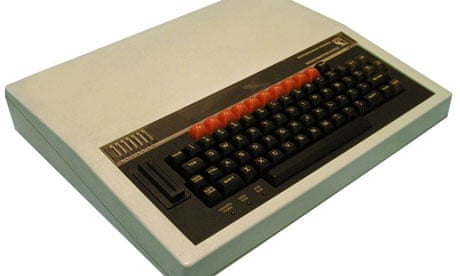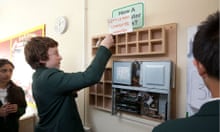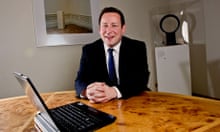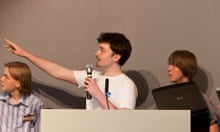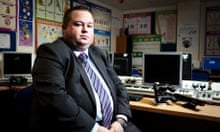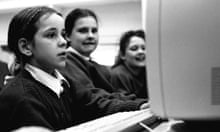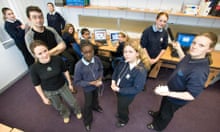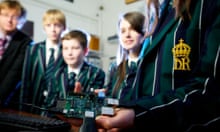Dan Frydman remembers clearly how the computer he used at school in the 1980s changed his life. Now 38, he was one of the generation who grew up with classroom computers that almost anyone could use to write self-contained programs – the equivalent of today's smartphone apps.
The computer was the BBC Micro, a computing revolution dressed in light brown plastic. Made by Acorn Computers of Cambridge, the first version, released in December 1981, included a simple programming language called BBC BASIC which even very young children could follow. And with coin arcades offering video games such as Space Invaders, this was their chance to create their own – free – version.
"We all had a bash [at programming it]," Frydman says. Though he moved into architecture, he came back to programming, designing and writing websites: "Without that early introduction to programming as something that was logical rather than scarily scientific, I don't think I'd have got into it," he says.
Originally called the Proton, the BBC Micro got its name after Acorn, then just two years old, won the contract to make the hardware for the BBC's then-ongoing computer literacy project. It was a contract that was the making of Acorn – and, arguably, the modern world, for a descendant of Acorn's chip design methods now powers every mobile phone, including the smartphones used by millions.
Neil Kinson, 42, says the appearance of the machine when he was at school in north-east England "inspired people to get under [its] covers… I had visions of my own little software empire." Though that didn't happen, he went on to study software engineering at university "otherwise I would have done a pure physics degree".
Another then-pupil, Nicholas Radcliffe, recalls that he "ended up producing commercial software for my local education authority" – and later use that skill to fund himself through university. "That BBC Micro experience led to everything I've done since, which has included being part of the formation of the Edinburgh Parallel Computing Centre (EPCC), spinning out my group from there as Quadstone Limited, a VC [venture capital]-based Edinburgh-based software company that was eventually acquired by Portrait Software."
Alhough the BBC only specified that 12,000 should be made (so viewers of its new Computer Programme would be able to share the experience of the new microcomputing revolution), uptake was so rapid that, in 1982, 24,000 were sold – and schools were soon ordering them by the thousand. By the 1990s, when PCs running Microsoft software began to supplant the ageing BBC devices in the classroom, a million had been sold.
The Micro wasn't cheap: prices started at £235 (£700 at current prices) and £335 (£1,000 at current prices) for the Model B, which became the iconic version. Prices rose slightly (to £299 and £399 – not that much more than a computer would cost today).
The specifications, by today's standards, were minuscule: a processor running at two megahertz, more than a thousand times slower than a typical CPU today, and 32 kilobytes of Ram. You had to plug it into a TV set as there was no monitor output. There was no hard drive; programs were stored on cassette tape, from which they could be played back or on to which they could be recorded. (Program names were also limited to a maximum of 10 characters.) Any of the 163,000 points, or pixels, on the screen could display eight colours, or flash in eight combinations of two colours. Today, screens offer millions of available colours and millions of pixels.
Yet the BBC Micro's arrival in classrooms as part of the government's initiative to drive computing use in schools revolutionised computing in Britain. Scores of small games and other software companies were set up by people who had got their start writing programs on the BBC Micro, and on other computers from the period, including the Sinclair ZX Spectrum, which also ran BASIC and was substantially cheaper at £80 (£240 at current prices).
But the arrival of those "more powerful" PCs spelt the death knell for the self-made classroom programmers: the new machines didn't have BASIC, and pupils were now taught "ICT" (information and communications technology) rather than coding.
Part of the effect has been the ongoing skills shortage in programming and the falling enrolment in university courses. Radcliffe thinks that "ironically, programming is much harder to get into now, for kids and others. It's a weird combination of things. Back then, every machine came with BASIC or similar. Programming was a much bigger part of experience. I also think there was less to learn, and the machines were less abstract. You could just set bits to draw on the screen. Now you have layer upon layer of abstraction to get through."
Where would he start now? "I think quite often about what I would be doing today if I were 12 or 14, and I'm certain the answer is badgering my parents for an iPad and a developer kit. The iPad is appealing because it does have all those sensors and access to so much stuff, and because of your ability to turn the whole device into a physical manifestation of something. But the learning curve to get the first thing working is really large in that environment; you can't really do it as a first thing."
Kinson suggests "it is simply a case of building the right curriculum, as virtually all of the infrastructure to do this exists today, but stripping back one or two layers of the usability of some of today's tools to ensure people learn the fundamental principles and skills".
But even while some wrestle with reviving the BBC Micro's legacy, it lives on in at least one form. Acorn, Apple and VLSI Technology teamed up to create a new company, Advanced Risc Machines – later shortened just to Arm – to make better versions of the specialised low-power chips that had run in the Acorn Archimedes computer, a successor to the BBC Micro.
An early ARM chip powered Apple's handheld Newton device. But ARM soon discovered new markets in mobile phones, and now billions of chips using ARM's designs power every smartphone in use, including the iPhone, BlackBerry, and Android devices.
